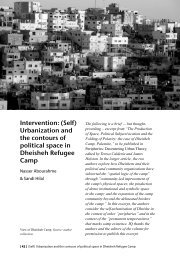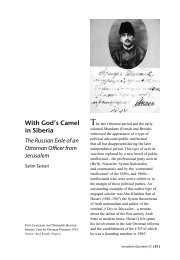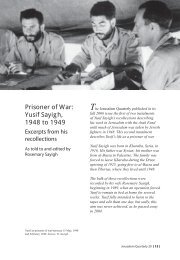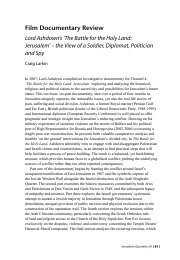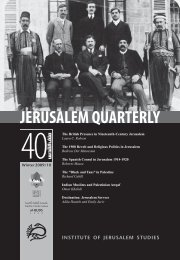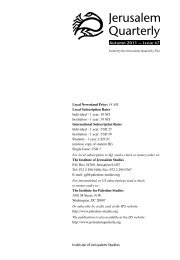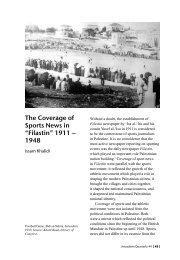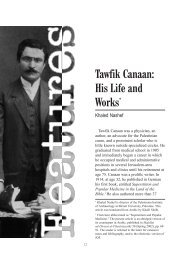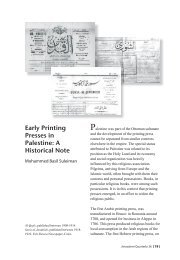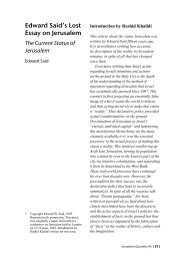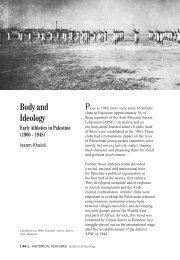Jurji Habib Hanania - Institute for Palestine Studies
Jurji Habib Hanania - Institute for Palestine Studies
Jurji Habib Hanania - Institute for Palestine Studies
You also want an ePaper? Increase the reach of your titles
YUMPU automatically turns print PDFs into web optimized ePapers that Google loves.
When the “age of despotism” ended with the introduction of a constitutional<br />
government in Turkey in 1908, <strong>Jurji</strong> quickly set the ball rolling. He telegraphed the<br />
appropriate department, quoting application # 85 that had been neglected <strong>for</strong> all of<br />
eight years, as well as other relevant documents. The permit was promptly issued<br />
and the newspaper began appearing soon after, all within months of the July 1908<br />
announcement of the new Ottoman government. <strong>Jurji</strong> started his first editorial with<br />
the words “Thank God”, and repeated his thanks to the Almighty several times in the<br />
course of that two-page editorial.<br />
The paper was allowed to appear twice a week, on Tuesdays and Fridays, and<br />
consisted of four pages. <strong>Jurji</strong> was at the same time its owner, publisher and editor. It<br />
had an attractive logo made up of an artistic rendering of the word “al-Quds” in Arabic<br />
(Arabic <strong>for</strong> ‘Jerusalem’) over which floated three connected stars labeled “freedom”,<br />
“equality” and “brotherhood”–the motto of the popular revolt that had brought about<br />
the constitution’s restoration. The name of the paper was given in both French and<br />
Arabic, as was in<strong>for</strong>mation about ownership (Georges I. <strong>Habib</strong> <strong>Hanania</strong>), annual<br />
subscription rates in Jerusalem, Turkey or “l’Etranger”, and advertising prices. Prices<br />
and rates <strong>for</strong> different purposes were stated in different currencies: Turkish mejidies,<br />
French francs and local piasters. No price was stated <strong>for</strong> single issues, implying that<br />
it was available only to subscribers, who were required to pay in advance. Each issue<br />
was printed in 1500 copies.<br />
As far as I can make out from all the sources that I have consulted, al-Quds was<br />
indeed the first privately owned Arabic newspaper in <strong>Palestine</strong> (something I know<br />
was taken <strong>for</strong> granted by the family). Suleiman’s 1987 book states that, be<strong>for</strong>e <strong>Jurji</strong><br />
<strong>Hanania</strong>’s paper appeared, there was only an official monthly paper, al-Quds al-<br />
Sharif (The Noble Jerusalem), irregularly issued by the Ottoman regime as of 1876<br />
in Turkish and Arabic. Soon after <strong>Jurji</strong>’s al-Quds appeared, a rival paper called<br />
Bashir Falastin (<strong>Palestine</strong> Herald) was published <strong>for</strong> a brief period <strong>for</strong> the purpose<br />
of defending the Greek Orthodox Church against challenges to its authority from the<br />
Arab Orthodox community. But there was no mention of this paper in other sources,<br />
and I suspect that it had a very brief run or very limited circulation, or both. Yehoshua<br />
has found that, by the time the Ottoman regime ended in 1918, as many as 30 Arabic<br />
newspapers had appeared in <strong>Palestine</strong> (in Haifa and Jaffa, as well as Jerusalem) but<br />
many of them had lasted <strong>for</strong> only a few months or a year and no copies of them were<br />
to be found. In one of his editorials in 1913, <strong>Jurji</strong> himself mentions that four papers<br />
were <strong>for</strong>ced to close down within a year or two of starting publication.<br />
<strong>Jurji</strong> described his paper as dealing with “science, literature and in<strong>for</strong>mation”. Of<br />
particular interest to him, at least in the beginning and according to his editorial policy<br />
as stated in the first issue, was the question of how best to overcome the problems<br />
resulting from the Ottoman’s earlier style of rule. It is clear from that statement that he<br />
considered “science, literature and in<strong>for</strong>mation” to have been badly neglected during<br />
[ 62 ] HISTORICAL FEATURES History of the Earliest Press in <strong>Palestine</strong>, 1908-1914



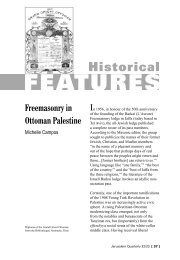
![In Search of Jerusalem Airport [pdf] - Jerusalem Quarterly](https://img.yumpu.com/49007736/1/180x260/in-search-of-jerusalem-airport-pdf-jerusalem-quarterly.jpg?quality=85)
